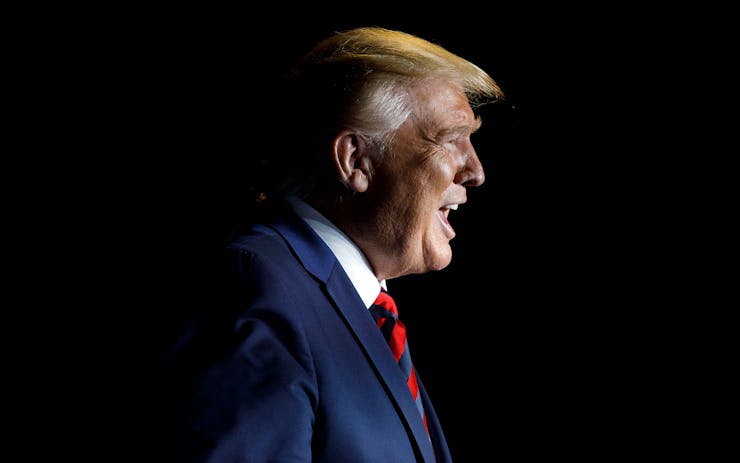Paul Armentano is the deputy director of NORML—the National Organization for the Reform of Marijuana Laws—and the co-author of the book Marijuana Is Safer: So Why Are We Driving People to Drink? (Chelsea Green, 2013). Leafly welcomes opinion contributions from industry and political leaders on a range of topics related to cannabis.
The Trump administration is sounding the alarm against the manufacture and marketing of certain vape products at a time when health officials nationwide are scrambling to determine why some consumers are suddenly becoming sick from vaping. But while the administration’s pending actions will no doubt influence commercial activities in the legal nicotine marketplace, they will have little if any impact on the gray market surrounding unregulated cannabis vapor cartridges – counterfeit products that have been primarily associated with the recent outbreak of serious lung illnesses in various states.
That is because the nicotine vapor market and the cannabis-oil vapor market are two entirely different entities. In the case of the former, nicotine is a federally legal product, and several licensed, large-scale corporations operate in this space. These companies will have little choice but to abide by the US Food and Drug Administration’s new rules and restrictions. By contrast, companies operating in the cannabis vapor space—in particular those unregulated players providing disposable products often sold on the street—will likely continue with business as usual. That’s because, in most cases, the manufacturers of these products, as well as the ingredients contained within them, are virtually unknown.
Until there is some change in the federal status of cannabis, consumers of cannabis-oil vape products are going to continue to be in situations where they don’t know whether or not they are getting a tested, quality product or some unlicensed knock-off.
This gray market exists and proliferates largely because cannabis and cannabis products remain classified as Schedule I prohibited controlled substances under federal law—a classification that is shared with heroin and LSD. This federal prohibition has made it historically difficult to clinically study the safety of these cannabis-oil delivery devices. As a result, the FDA is powerless to provide regulatory recommendations, standards, oversight, or quality controls to this rapidly emerging market. (The DEA and other federal law enforcement agencies, by contrast, do possess the power to arrest those involved in these markets, though they lack the authority to make such products and practices any more ‘illegal’ under federal law than they already are.)
Instead, this heavy burden relies on state regulators in those jurisdictions that have legalized cannabis use. These regulations are far from consistent from state to state and far from comprehensive. In some cases, they are also unable to keep up to speed with rapid changes in these products’ manufacturing practices. (By contrast, the vaping of plant cannabis flowers—a much more long-standing and well-studied practice—is not associated with these same significant health risks.) For instance, New York State public officials have suggested that many of those sickened in their state became ill as a result of consuming vitamin E oil, which was added to certain unregulated oils as a thickening agent. But until this latest outbreak, regulators had never tested products for the presence of vitamin E oil. And according to many experts, underground players only began adding these contaminants to certain products in the past few months.
This is why the National Organization for the Reform of Marijuana Laws (NORML) and other consumer advocacy groups in the cannabis space have consistently called for greater regulation, standardization, and oversight of the cannabis market. And while individual state regulators can and ought to do their part, ultimately the burden of regulatory oversight must fall upon the US Food and Drug Administration – the very same agency that, under continued prohibition, is largely forced to take a hands-off approach to the issue. Under the proposed Trump plan, it will continue to do so in the future.
In short, until there is some change in the federal status of cannabis, consumers of these cannabis-oil vape products are going to continue to be in situations where they don’t confidently know whether or not they are getting an independently tested, quality product or some unlicensed knock-off. As a general rule, products sold at licensed cannabis retailers in legal states that are manufactured by state-licensed entities, that are compliant with existing state regulations, and that are lab-tested for purity prior to market are likely going to be of greater quality and safety than those that are not.
Similar issues have plagued the commercial CBD market for years now, as the lack of a federal regulatory framework has led to CBD-infused extracts and oil products of variable quality, purity, and safety flooding the market. As in the case of unregulated vape manufacturers, these largely unknown players similarly push out cheap, unlicensed products of questionable purity and safety.
Rather than use these unfortunate incidents as an opportunity to further drive these markets into the shadows, the administration should officially legalize cannabis and empower the FDA to better study, regulate, and oversee these emerging THC and CBD delivery devices—and to create state-level regulatory standards for legal states to follow and enforce.
The irony is that, because of decades of cannabis prohibition, the agency is only now beginning to scrutinize these cartridges and the plethora of questionable compounds, additives, and agents in many of them. In an environment where cannabis was federally legal and acceptable, the FDA and other federal regulatory agencies would certainly have done so sooner. And Americans would be safer because of it.






